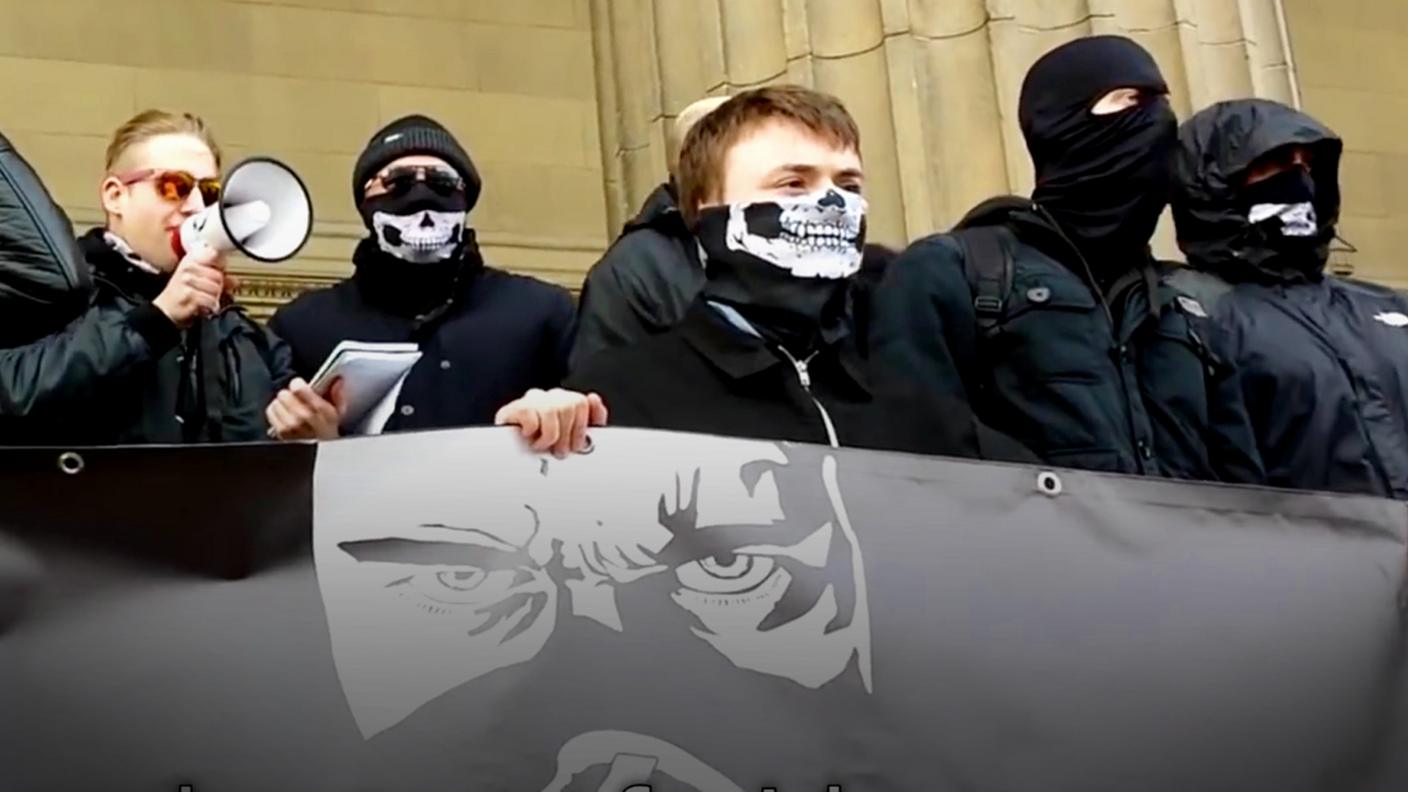How neo-Nazi group National Action targeted young people
- Published
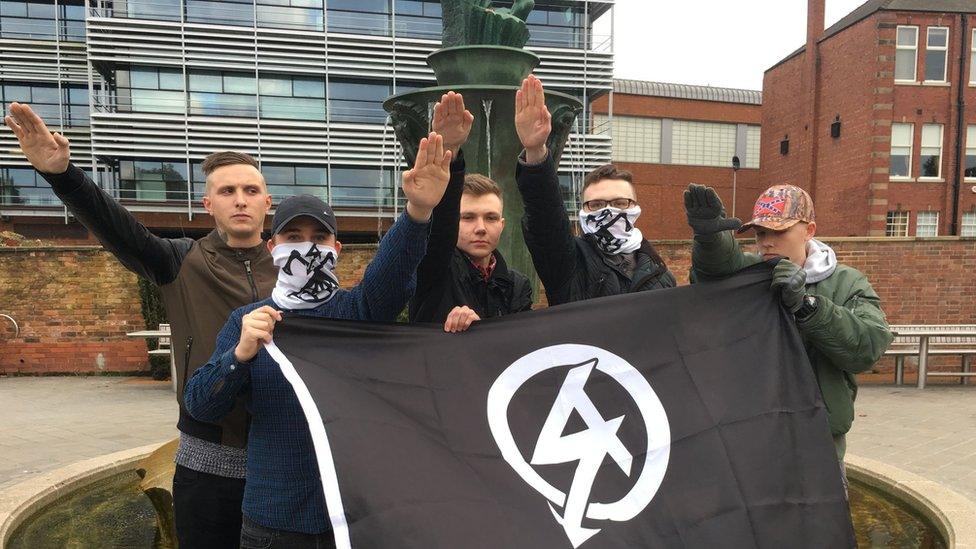
Daniel Ward, Connor Scothern, Garry Jack, Alex Deakin and Adam Thomas all remained members of the banned group
The conviction of four people at Birmingham Crown Court this week for membership of the banned neo-Nazi organisation National Action concluded a series of trials linked to the group.
Since it became the first extreme right-wing organisation to be proscribed under terrorism legislation in December 2016, at least 15 court cases - including two retrials - have taken place involving members and former members.
Nine involved terror offences, two involved sexual offences concerning children, with the rest relating to public order offences such as stirring up racial hatred.
Fifteen people have been convicted of remaining members of the group after it was outlawed.
So what do we now know about National Action?
Who was radicalised?
While it was never a political party and lacked the formal traits associated with being one, National Action nevertheless had a structure and an external identity.
It also had a clear recruitment strategy: focus on the young.
Places of educations were plastered with group propaganda, including Warwick University and Aston University in Birmingham.
Some of those who founded and ran it had previously been involved with other organisations, including the British National Party.
They subsequently sought to bring young people directly into National Action, which set itself against far-right political parties, presenting itself as an overtly neo-Nazi street movement that rejected the democratic system.
While some leading figures in the new group were in their 30s, most were younger.
Having been recently radicalised themselves, they knew how to radicalise others.
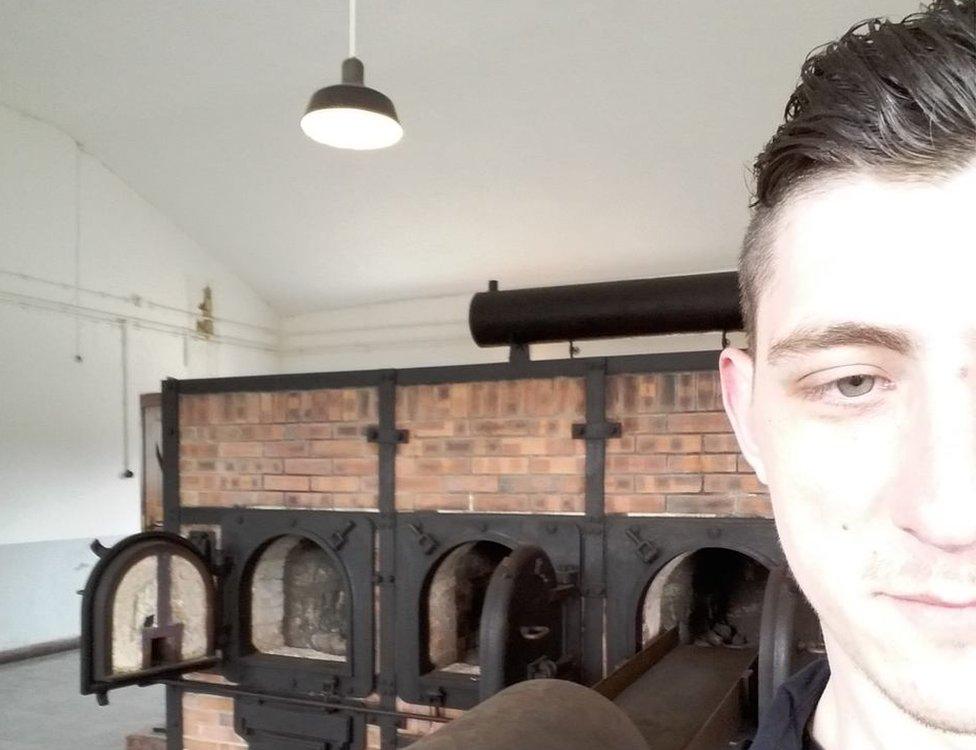
Mark Jones took pictures of himself at Buchenwald, a Nazi concentration camp
As a teenager, Mark Jones had been close to senior BNP figures and featured in its promotional material.
He would leave the party and join National Action, forming a relationship with his eventual co-defendant Alice Cutter, an entrant in the group's 'Miss Hitler' competition.
In one message from 2014 seen by jurors, an email account that Jones attributed to the ex-BNP leader Nick Griffin asked him: "Have you ever looked at Inspire? It's the online magazine of al-Qaeda.
"A very interesting model for online self-radicalisation. A nationalist version is clearly needed."
National Action would exploit the internet in the same way other terrorist groups do.
Those involved created videos, memes, and written diatribes.

Read more about National Action:
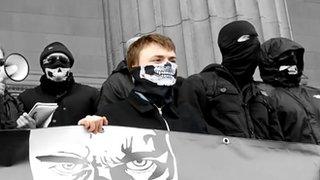
More than a dozen court cases have taken place involving members and ex-members of National Action since it was banned in 2016.

Evidence in the trials included a series of emails inquiring about membership sent to the National Action inbox, with responsibility for the prospective recruits delegated out to regional organisers.
Some were pathetic in tone. Others immediately alarming in that the author expressed a desire for violence.
Garry Jack, from Birmingham, told jurors that he was attracted to National Action because it was a "youth organisation" whereas the National Front was "full of middle-aged men".
Jack, 24, who said he had suffered from "crippling anxiety" which interfered with education and work, described how he subsequently came to rely on Ben Raymond, 30, one of the National Action founders, for "emotional support".
Grooming new members
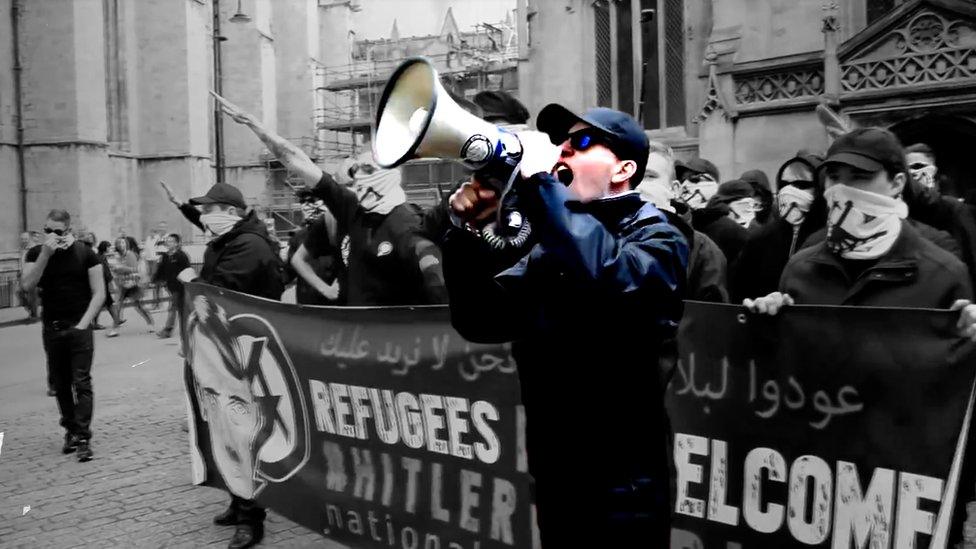
National Action was founded in 2013 by Ben Raymond and Alex Davies (pictured)
This process of grooming was well illustrated by a message exchange between Mark Jones and co-founder Alex Davies.
Davies wrote regarding "somebody who contacted us before living in the south west is now moving to London, do you mind if I pass on your details to him?"
Jones, originally from London, replied "sure thing" before adding "you want me to groom him for NA?"
The pair also discussed a potential schoolgirl recruit, with Davies writing "I'd be sceptical of the commitment or value of a girl her age other than as breeding stock".
'Brainwashed'

The father of Connor Scothern, pictured, feared he had been "brainwashed"
One of the defendants in the final trial - Connor Scothern, now 19, from Nottingham - had become involved in the group while he was a schoolboy.
Text messages showed a 15-year-old Scothern being asked by his father: "You sound a bit brainwashed, are you being groomed?"
His father warned that "sooner or later" he would go to prison, which Scothern responded to with extremist ranting.
Scothern had spent his youth restlessly trying out different beliefs.
At one stage he was drawn to communism and for a short time, aged 12-13, he practised Islam.
Another youth - Jack Coulson, then aged 17 and from Bradford - was similar.
He bounced from Trotskyism to Stalinism to Anarchism, while also researching different religions, including Islam, Christianity, and his own Jewish heritage.
After inquiring about membership, he had been contacted by an older man and was soon meeting other members, attending aggressive demonstrations, and being invited into vile private chat groups where jokes were made about bombing Leeds.
Coulson, more literal-minded than some, began acting up to his peers and became increasingly hubristic.
In an online forum where he had once complained of loneliness, he returned to announce this was no longer the case.
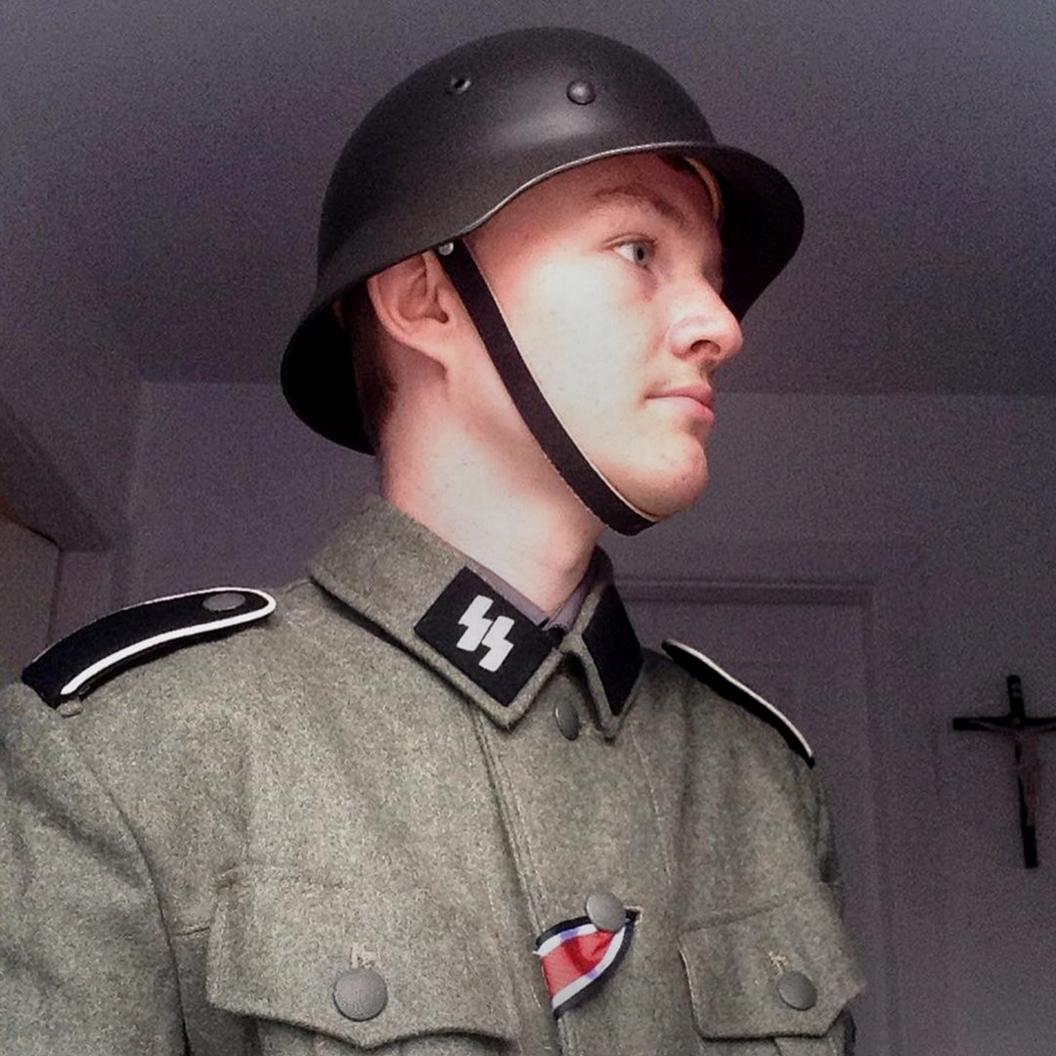
Jack Coulson dressed in a Nazi uniform
"Now, having joined a particular group of people," he explained, "I feel welcomed and whole. Like I truly belong.
"We are national socialist youth, and we fight for the emancipation of Europe! My plans in the future depend upon my ability to construct munitions.
"The war is beginning, it's happening. We have to arm ourselves with whatever we can get, and it'll be glorious when that day arrives. I can't wait to ethnically cleanse my city."
He would be arrested after posting pictures online of a home-made pipe bomb, eventually faced two court cases in the post-ban period and is currently in prison for possessing a terrorist manual.
Glorification of MP's murder
What was clear is that terrorism breeds terrorism.
The murder of Labour MP Jo Cox by a white supremacist was glorified by National Action - an act which partly accounted for its proscription.
The murder was also personally cited by both Coulson and Jack Renshaw, a pre-ban National Action member who pleaded guilty to a terrorist plot to kill the Labour MP Rosie Cooper.
What the cases showed is that National Action - and those who share its ideology - are not simply pushing far-right ideas on a few issues and policy areas, but promoting an all-encompassing neo-Nazi world view, a quasi-religion founded on racism and hatred.
Few of those before the courts said they totally renounced their beliefs.
One member who had pleaded guilty - Nathan Pryke - wrote to the judge saying he disowned his neo-Nazi ideas.
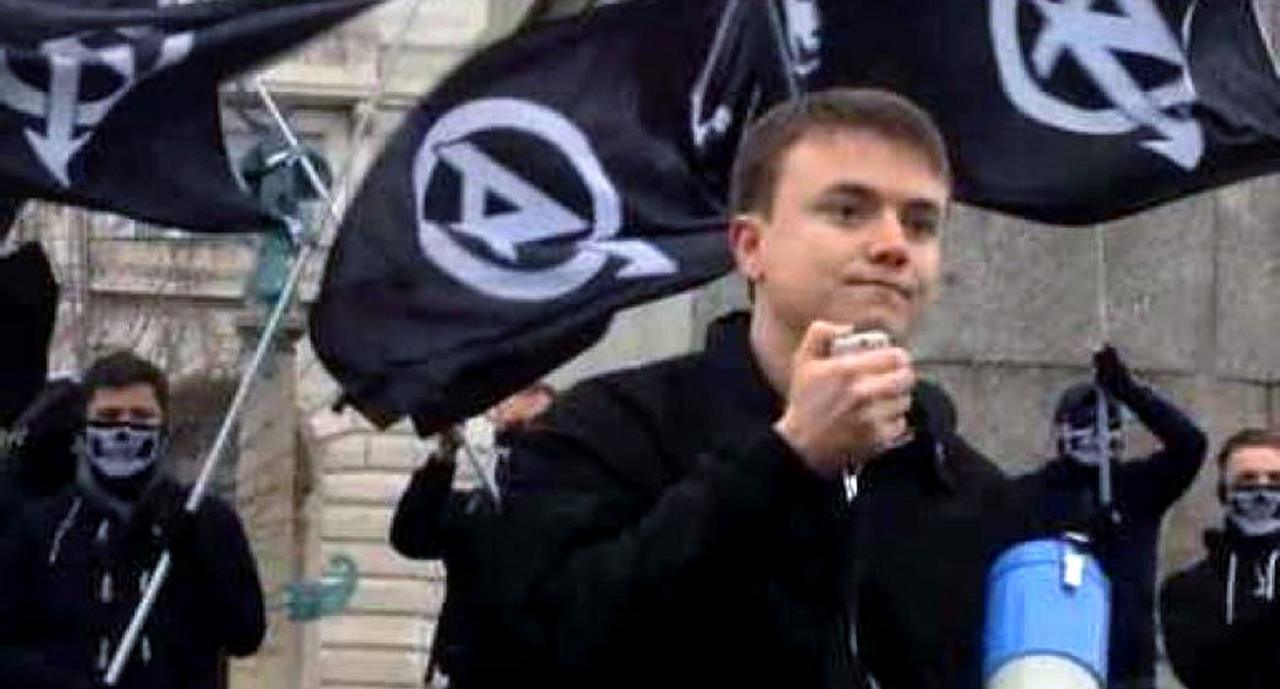
Jack Renshaw at a National Action rally
Pryke's barrister said his client recognised "just how grave and vile and repugnant" his views had been and asked that his "shame and embarrassment" be publicly known.
The court heard that another member - Joel Wilmore, who also pleaded guilty - had come to know people from different backgrounds while in prison and that he disavowed all for which he had previously stood.
Others, like Renshaw and Jones, appeared wedded to and warped by their ideas - clinging on despite the wreckage they have caused.
Radicalisation happens where life happens - online, in books, and in person - and can occur without groups like National Action playing a role.
The online spaces where extremists often make first contact with one another can and do generate groups of individuals who encourage one another's worst tendencies, even if they never develop into formal organisations.
Reflecting on how people - particularly the young - are targeted for radicalisation by groups like National Action is useful, but it may only be one of the more visible ways in which the process occurs.
- Published12 November 2018
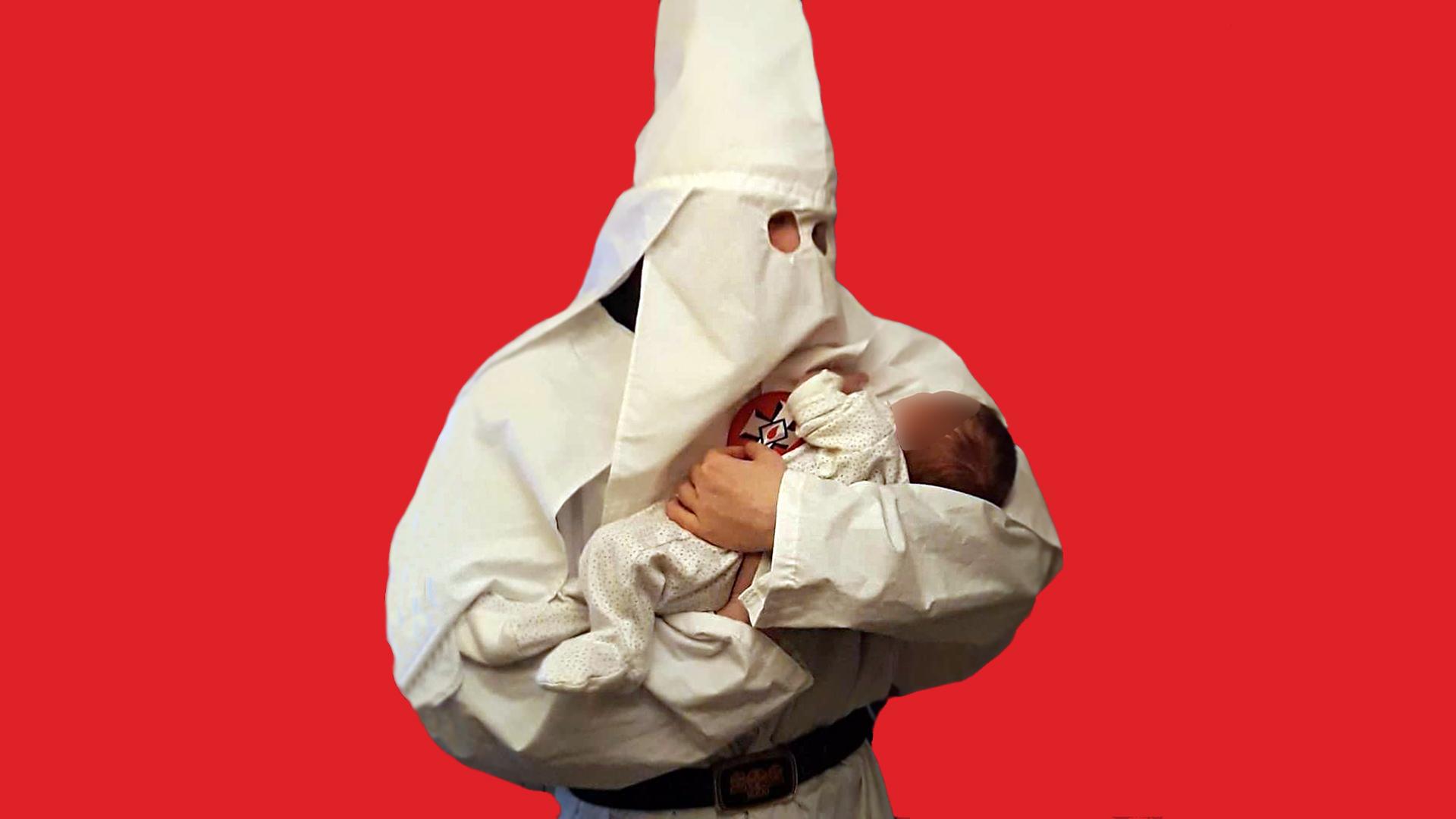
- Published2 April 2019
